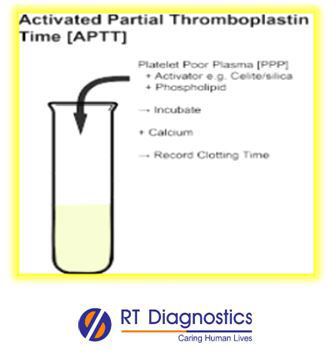APTT
This test is also known as PTT, APTT, and aPTT. There are certain types of proteins in the blood is known as COAGULATION, which are responsible for the blood clotting process. This test is suggested when blood clotting time extends and the occurrence of repeated miscarriages. This test calculates the time taken for blood clotting to diagnose abnormalities in the bleeding disorders (thrombotic episode) and screening of anti-phospholipid syndrome and during the prognosis of the treatment during the administration of anticoagulant.
aPTT: (PARTIAL THROMBO PLASTIN TIME):
Why Activated Partial Thromboplastin Time test?
CLINICAL INFORMATION :
Activated partial thromboplastin time is also called partial thromboplastin time. It is a screening test that helps to evaluate the patient’s ability to form clots. This test procedure measures the time taken for the clot to form in a blood sample specimen with the addition of appropriate required substances (coagulation factors such as factor VIII, factor IX, factor XI factor, XII, Vitamin-K and Calcium, etc), needed for it (in-vitro). Thus it evaluates the extrinsic and common pathways of the coagulation cascade. This test is useful when someone has unexplained bleeding or clotting because it is the starting point of investigating the cause of a bleeding or blood clot/thrombotic episode. An abnormally short clotting time may be a sign of increased risk of thrombosis (blood clots) or multiple miscarriages. A longer than normal partial thromboplastin time (PTT) may be caused by conditions such as liver diseases, anti-phospholipid antibody syndrome or lupus anticoagulant syndrome forming a blood clot in blood vessels, clotting factor deficiencies, bleeding disorders like Von-Willebrand disease, and other diseases like hemophilia that prevents blood from clotting, hence further investigations are needed to find the deficiency of clotting factors. Moreover, aPTT is most commonly used in the prognosis of treatment in heparin therapy. If untreated the complications include life-threatening conditions such as stroke heart attack etc.

General instructions:
Sample Requirement: Specimen - Blood sample collected from the vein. Test Preparation: None.
NOTE - Sample for specimen collections may vary based on the patient’s condition/cases according to the patient’s presenting complaints/signs or symptoms:
SPECIMEN REQUIREMENT (Special or Rare Cases) - As instructed and guided by Physician / Clinician / Pathologist / as per Laboratory’s requirements, according to procedures and protocols.
This Multi-Specialty Clinical Referral Laboratory RTDIAGNOSTICS provides precise and accurate tests with an extensive range of testing services to the medical centers to help in the diagnosis and identification of pathology in the test specimens for infectious diseases and also to evaluate the function of organ systems of the patient. It prevents further complications and helps to stabilize and restore health to near normalcy at the earliest without delay.



